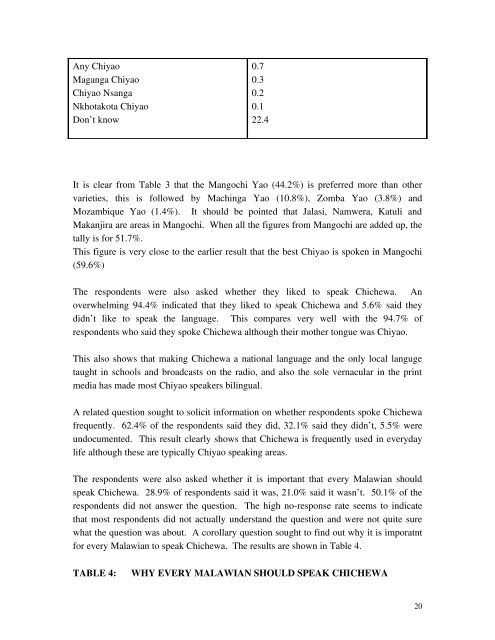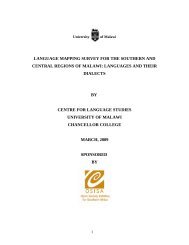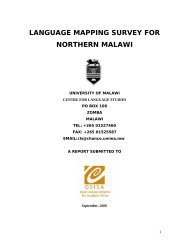SOCIOLOLINGUISTIC SURVEYS - Centre for Language Studies
SOCIOLOLINGUISTIC SURVEYS - Centre for Language Studies
SOCIOLOLINGUISTIC SURVEYS - Centre for Language Studies
You also want an ePaper? Increase the reach of your titles
YUMPU automatically turns print PDFs into web optimized ePapers that Google loves.
Any Chiyao<br />
Maganga Chiyao<br />
Chiyao Nsanga<br />
Nkhotakota Chiyao<br />
Don’t know<br />
0.7<br />
0.3<br />
0.2<br />
0.1<br />
22.4<br />
It is clear from Table 3 that the Mangochi Yao (44.2%) is preferred more than other<br />
varieties, this is followed by Machinga Yao (10.8%), Zomba Yao (3.8%) and<br />
Mozambique Yao (1.4%). It should be pointed that Jalasi, Namwera, Katuli and<br />
Makanjira are areas in Mangochi. When all the figures from Mangochi are added up, the<br />
tally is <strong>for</strong> 51.7%.<br />
This figure is very close to the earlier result that the best Chiyao is spoken in Mangochi<br />
(59.6%)<br />
The respondents were also asked whether they liked to speak Chichewa. An<br />
overwhelming 94.4% indicated that they liked to speak Chichewa and 5.6% said they<br />
didn’t like to speak the language. This compares very well with the 94.7% of<br />
respondents who said they spoke Chichewa although their mother tongue was Chiyao.<br />
This also shows that making Chichewa a national language and the only local languge<br />
taught in schools and broadcasts on the radio, and also the sole vernacular in the print<br />
media has made most Chiyao speakers bilingual.<br />
A related question sought to solicit in<strong>for</strong>mation on whether respondents spoke Chichewa<br />
frequently. 62.4% of the respondents said they did, 32.1% said they didn’t, 5.5% were<br />
undocumented. This result clearly shows that Chichewa is frequently used in everyday<br />
life although these are typically Chiyao speaking areas.<br />
The respondents were also asked whether it is important that every Malawian should<br />
speak Chichewa. 28.9% of respondents said it was, 21.0% said it wasn’t. 50.1% of the<br />
respondents did not answer the question. The high noresponse rate seems to indicate<br />
that most respondents did not actually understand the question and were not quite sure<br />
what the question was about. A corollary question sought to find out why it is imporatnt<br />
<strong>for</strong> every Malawian to speak Chichewa. The results are shown in Table 4.<br />
TABLE 4:<br />
WHY EVERY MALAWIAN SHOULD SPEAK CHICHEWA<br />
20





